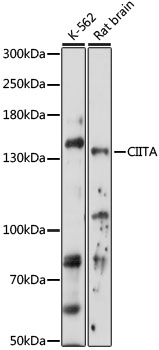-
Product Name
CIITA Polyclonal Antibody
- Documents
-
Description
Polyclonal antibody to CIITA
-
Tested applications
WB
-
Species reactivity
Human, Rat
-
Alternative names
CIITA antibody; C2TA antibody; CIITAIV antibody; MHC2TA antibody; NLRA antibody; MHC class II transactivator antibody
-
Isotype
Rabbit IgG
-
Preparation
Antigen: A synthetic peptide corresponding to a sequence within amino acids 650-750 of human CIITA (NP_000237.2).
-
Clonality
Polyclonal
-
Formulation
PBS with 0.02% sodium azide, 50% glycerol, pH7.3.
-
Storage instructions
Store at -20℃. Avoid freeze / thaw cycles.
-
Applications
WB 1:500 - 1:2000
-
Validations

Western blot - CIITA Polyclonal Antibody
Western blot analysis of extracts of various cell lines, using CIITA antibody at 1:1000 dilution.Secondary antibody: HRP Goat Anti-Rabbit IgG (H+L) at 1:10000 dilution.Lysates/proteins: 25ug per lane.Blocking buffer: 3% nonfat dry milk in TBST.Detection: ECL Basic Kit .Exposure time: 5s.
-
Background
Essential for transcriptional activity of the HLA class II promoter; activation is via the proximal promoter. No DNA binding of in vitro translated CIITA was detected. May act in a coactivator-like fashion through protein-protein interactions by contacting factors binding to the proximal MHC class II promoter, to elements of the transcription machinery, or both. Alternatively it may activate HLA class II transcription by modifying proteins that bind to the MHC class II promoter. Also mediates enhanced MHC class I transcription; the promoter element requirements for CIITA-mediated transcription are distinct from those of constitutive MHC class I transcription, and CIITA can functionally replace TAF1 at these genes. Exhibits intrinsic GTP-stimulated acetyltransferase activity. Exhibits serine/threonine protein kinase activity: can phosphorylate the TFIID component TAF7, the RAP74 subunit of the general transcription factor TFIIF, histone H2B at 'Ser-37' and other histones (in vitro).
Related Products / Services
Please note: All products are "FOR RESEARCH USE ONLY AND ARE NOT INTENDED FOR DIAGNOSTIC OR THERAPEUTIC USE"
